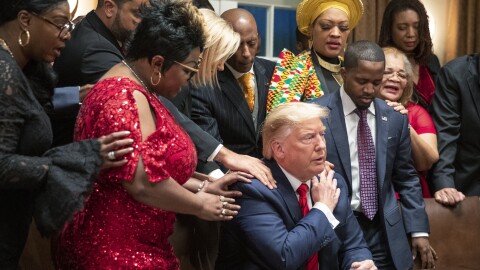In 2016, Black voters in Ohio were among those most targeted for digital-media misinformation. Often, the goal wasnŌĆÖt so much to sway their votes as to ensure they wouldnŌĆÖt vote at all.
Ohio voting advocates are concerned the same type of campaign is in play this year ŌĆō but many are going on offense instead.
One of the most high-profile campaigns is ŌĆ£,ŌĆØ spearheaded by LeBron James and other athletes this summer.
ŌĆ£We need you to join us to vote like our lives depend on it," James underscores in a video encouraging people to vote, "because they do.ŌĆØ Another video recruits young people to be poll workers, while another talks about legacy.
But such efforts are running up against powerful counter-messaging: that Black votes donŌĆÖt matter because neither Democrats nor Republicans really care.
Curtis Maples, a member of the board of the , says that counter-messaging works because itŌĆÖs layered onto a reality that Black interests often have been discounted by people in power.
ŌĆ£You can use the logical fallacy of suggesting, well, since racism is still here and youŌĆÖve been voting Democrat all this long time, therefore the Democrats have done nothing for you," says Maples, who is Black. "In reality, itŌĆÖs far more complicated than that. But itŌĆÖs enough for a tweet or a meme."
Maples has spent a lot of time studying the tools used for more than a century to keep African Americans from voting. Many are neither new nor subtle: poll taxes, literacy laws, voting prohibitions against former felons, laws to scale back the early, in-person voting that Black voters embrace.
But Maples said social media has offered a suppression tool that is personal, massive and extra-ordinarily hard to track.
ŌĆ£With the advent of technology and social media, lies travel faster than the truth,ŌĆØ Maples says.
Young Mie Kim, who specializes in the study of digital media and politics at the University of Wisconsin, notes that lies rarely sway a voter to support another candidate. But theyŌĆÖre great at sowing confusion and apathy with messages ŌĆ£targeting African Americans, like ŌĆśNeither candidate serves African-American communities, so your vote is not going to count anyway.ŌĆÖŌĆØ
She said Russian intelligence was an early adopter of the tactic, but it isnŌĆÖt alone. And last month, the British public television station Channel 4 how deep a root it took in 2016.
ŌĆ£What we found is that in those crucial swing states, Black voters were disproportionately marked for deterrence,ŌĆØ Channel 4 reported.
It found the Trump campaign used a massive database to target 3.5 million African American voters in Ohio and other swing states to get them to sit out the 2016 election. The social media messages micro-targeted everything from a voterŌĆÖs personality type to their income to whether they owned a dog.
That election, Black voter turnout dropped for the first time in 20 years.
But this year, Democrats are not ceding one of their most loyal voting blocs. The Democratic National Committee has upped digital advertising and ad buys on Black radio stations and newspapers in Ohio, headlined with the message, ŌĆ£Our lives are on the ballot.ŌĆØ
Maples said Democrats must recognize why the discouraging messages of 2016 resonated, by openly acknowledging racism is reality.
ŌĆ£We are keenly aware that ŌĆścolorblindŌĆÖ or neutral policies when you have an unequal society is a tacit admission that you want things to stay exactly the same,ŌĆØ he said.
But Maples also advocates a change in tactics. Many get-out-the-Black-vote efforts rely on pride in the accomplishments of the Civil Rights movement, but studies show shame may be more powerful, especially among those who rarely vote.
ŌĆ£They sent out postcards that threatened to say, 'This is your voter record (because your voter record is public), and weŌĆÖll let all your neighbors know if you didnŌĆÖt vote.' That increased voter turnout by 28%,ŌĆØ Maples says.
Advocates are also exploring how to tap into the energy of the summerŌĆÖs racial justice protests.
Raymond Greene of , which focuses on civic engagement in Black communities in Ohio, said campaigns should borrow from what galvanized and mobilized the protests instead of only offering triedŌĆöbut often tiredŌĆöopportunities like phone banks.
"During a protest, youŌĆÖve got creative artists; youŌĆÖve got the spoken word; youŌĆÖve got music being created along with the protests. You get to see regular people become influencers,ŌĆØ Greene said. ŌĆ£And what weŌĆÖre saying is actually, that should be in our electoral work also.ŌĆØ
But, perhaps counter-intuitively, protesting and voting donŌĆÖt automatically go hand-in-hand. Some of those who took to the streets this summer see it as the path to needed revolutionary change, whereas voting is the status quo.
Ohio voting advocates say the challenge is convincing Black voters there is power in both.





